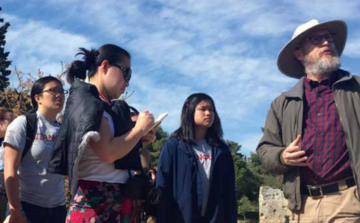Why Classics?
Explore Develop Grow Think Create
Why Classics?

Make Connections
Classics is a broad discipline, embracing more than 2,000 years of western language, literature, art, thought, history, and architecture. It constantly reveals the influence of the ancient Mediterranean world on our modern times—in the arts, sciences, medicine, geopolitics, law, entertainment, and religion. Classics sheds light on the foundations of many fields: students regularly pair classics with subjects ranging from biology and electrical engineering to English and political science.
What does it mean to be human? How should we live our lives? Can the past be a source of new ideas? What are the origins of Western Languages, Literature, Politics, and Philosophy?
Stanford’s highly interdisciplinary classics program, one of the nation’s largest, offers courses in all aspects of theancient Mediterranean world and its legacy. Students may concentrate in one or more of the following:
- Ancient History
- Classical Studies
- Greek
- Latin
Build on your foundation and pursue your interests with compelling courses like:
- To Die For: Antigone and Political Dissent
- Ten Things: An Archaeology of Design
- Gender and Power in Ancient Rome
- The Romans
- Sappho: Erotic Poetess of Lesbos
Meet Some of Our People

Dan-El Padilla Peralta (PhD 2014) explores the question "why should you study Classics?" in an essay that riffs on subjects ranging from the contemporary relevance of Greco-Roman culture to Jay-Z and the Wu-Tang Clan.

Federica Carugati (PhD 2015) looks at theories of political and economic development in Athens, relating the classical world to both the Cold War and modern era.

Richard Saller, Professor of Classics and History describes the unlikely path he took toward the Classics: Students should explore a wide range of courses to develop multiple ways of thinking and to find their personal passion, which may turn up in unexpected places...

Lloyd Minor, Dean of the School of Medicine discusses the value of a humanities education for aspiring professionals: We as physicians heal best when we listen to and communicate with our patients and seek to understand the challenges they face in their lives. The perspectives on illness, emotions and the human condition we gain from literature, religion and philosophy provide us with important contexts for fulfilling these roles and responsibilities...

Mary Beard, Classicist, author, and Cambridge professor, explores the future of Classics in an article in the New York Review of Books: I want to try to get a new angle...to go beyond the usual gloomy cliches and to take a fresh look at what we think we mean by "the classics."

Stanford undergraduate Liam Kinney tackles the question "why Classics?" in this Buzzfeed-style article. Read how Classics can help you score higher on the GRE, get into professional grad programs, network with a vibrant community, and unlock your creative passions:
12 Reasons to Study Classics in the 21st Century
Liam (far left) recently completed a semester abroad at the Intercollegiate Center for Classical Studies in Rome. Undergraduates in the Stanford Classics department have the opportunity to design their own study abroad experiences by applying for travel and research grants.

Still not convinced?
Click below to read testimonials from other Stanford alumni on how Classics has impacted them and their careers in post-Farm life!
Explore the Careers of Humanities Alumni to learn what humanities majors from Stanford have pursued since 2001.